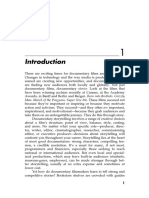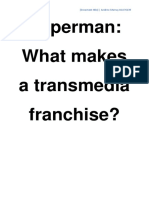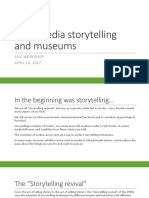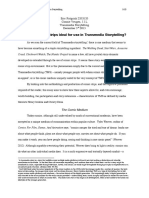0 ratings0% found this document useful (0 votes)
320 viewsNarrative Theories
Narrative Theories
Uploaded by
mclatchThis document summarizes four influential narrative theories: Todorov, Barthes, McKee, and Vogler. Todorov proposed a 5-stage model of narrative including equilibrium, disruption, realization, attempt to repair, and restoration. Barthes identified 5 codes that make up narratives: action, enigma, semantic, symbolic, and action. McKee described narrative as having an inciting incident, progressive complications, crisis, climax, and resolution. Vogler's influential theory described the hero's journey through 12 stages from the ordinary world to gaining an elixir.
Copyright:
© All Rights Reserved
Available Formats
Download as DOCX, PDF, TXT or read online from Scribd
Narrative Theories
Narrative Theories
Uploaded by
mclatch0 ratings0% found this document useful (0 votes)
320 views3 pagesThis document summarizes four influential narrative theories: Todorov, Barthes, McKee, and Vogler. Todorov proposed a 5-stage model of narrative including equilibrium, disruption, realization, attempt to repair, and restoration. Barthes identified 5 codes that make up narratives: action, enigma, semantic, symbolic, and action. McKee described narrative as having an inciting incident, progressive complications, crisis, climax, and resolution. Vogler's influential theory described the hero's journey through 12 stages from the ordinary world to gaining an elixir.
Original Description:
A Level Media Narrative Theories
Copyright
© © All Rights Reserved
Available Formats
DOCX, PDF, TXT or read online from Scribd
Share this document
Did you find this document useful?
Is this content inappropriate?
This document summarizes four influential narrative theories: Todorov, Barthes, McKee, and Vogler. Todorov proposed a 5-stage model of narrative including equilibrium, disruption, realization, attempt to repair, and restoration. Barthes identified 5 codes that make up narratives: action, enigma, semantic, symbolic, and action. McKee described narrative as having an inciting incident, progressive complications, crisis, climax, and resolution. Vogler's influential theory described the hero's journey through 12 stages from the ordinary world to gaining an elixir.
Copyright:
© All Rights Reserved
Available Formats
Download as DOCX, PDF, TXT or read online from Scribd
Download as docx, pdf, or txt
0 ratings0% found this document useful (0 votes)
320 views3 pagesNarrative Theories
Narrative Theories
Uploaded by
mclatchThis document summarizes four influential narrative theories: Todorov, Barthes, McKee, and Vogler. Todorov proposed a 5-stage model of narrative including equilibrium, disruption, realization, attempt to repair, and restoration. Barthes identified 5 codes that make up narratives: action, enigma, semantic, symbolic, and action. McKee described narrative as having an inciting incident, progressive complications, crisis, climax, and resolution. Vogler's influential theory described the hero's journey through 12 stages from the ordinary world to gaining an elixir.
Copyright:
© All Rights Reserved
Available Formats
Download as DOCX, PDF, TXT or read online from Scribd
Download as docx, pdf, or txt
You are on page 1of 3
Narrative Theories:
Todorov, Barthes, McKee and Vogler
Tzvetan Todorov Narrative Theory
Todorov was a Bulgarian linguist publishing work on narrative since the
1960s. He suggested there were 5 stages to a narrative:
1. Equilibrium A happy start
2. A disruption of this equilibrium by an event A problem occurs
3. A realisation that a disruption has happened
4. An attempt to repair the damage of the disruption the problem is
solved
A restoration of the eqilibrium A happy ending
(http://heathenmedia.co.uk/insanity/2012/02/08/narrative-todorovs-theory-2/)
Roland Barthes Narrative Theory
Roland Barthes was a French Philosopher who tried to bring
meaning to text. According to Roland Barthes all narratives
share structural features that each narrative weaves together in
different ways.
Roland Barthes narrative theory claims that a narrative can be broken down into five codes
or sets of rules. These are:
- Action code, Applies to any action that implies a further narrative action.
- Enigma code, Refers to any element in a story that is not explained and therefore
exists as an enigma for the audience, raising questions that demand an explanation.
- Semantic code Any element in a text that suggests an additional meaning by
connotations.
- Symbolic code, similar to the semantic code, but acts at a wider level where new
meaning arises out of conflicting ideas.
(Mediaknowall.com)
Robert McKee Narrative Theory
Robert McKee, an American screenwriter, offers a slightly different version of
Narrative, Including:
- Inciting Incident: An event happens that sets the story
going
- Progressive Complications: For a key character, things
just keep getting worse
- Crisis: Things get even worse it looks like its all over
for the hero
- Climax: Things are now so bad, drastic action is called
for
- Resolution: Whatever the problem was is sorted out and all is well again.
(storycharts.ca/pages/theory)
Christopher Vogler Narrative Theory
Christopher Vogler analysed a range of films for Hollywood film companies. His
explanation of character archetypes and the 12 stages of the heros journey in
films have become incredibly influential in Hollywood. Here is a visual picture of
Voglers theory
- Ordinary World - The hero's normal world before the story begins
- Call to Adventure - The hero is presented with a problem, challenge or
adventure
- Refusal of the Call - The hero refuses the challenge or journey, usually
because he's scared
- Meeting with the Mentor - The hero meets a mentor to gain advice or
training for the adventure
- Crossing the First Threshold- The hero crosses leaves the ordinary world
and goes into the special world
- Tests, Allies, Enemies - The hero faces tests, meets allies, confronts
enemies & learn the rules of the special world
- Approach - The hero has hit setbacks during tests & may need to try a
new idea
- Ordeal - The biggest life or death crisis
- Reward - The hero has survived death, overcomes his fear and now earns
the reward
- The Road Back - The hero must return to the Ordinary World
- Resurrection Hero - another test where the hero faces death he has to
use everything he's learned
- Return with Elixir - The hero returns from the journey with the elixir, and
uses it to help everyone in the Ordinary World
(http://glipho.com/topics/christopher-vogler)
You might also like
- Suzuki Alto Electrical Wiring DiagramDocument99 pagesSuzuki Alto Electrical Wiring Diagramromo25% (28)
- 2022 - 2023 - BLOCO - 1.D.P.11 - 17 - Documentary Storytelling Second Edition Making Stronger and More Dramatic Nonfiction Films by Sheila Curran Bernard Z-Liborg Cópia CópiaDocument7 pages2022 - 2023 - BLOCO - 1.D.P.11 - 17 - Documentary Storytelling Second Edition Making Stronger and More Dramatic Nonfiction Films by Sheila Curran Bernard Z-Liborg Cópia CópiaBernardo P. Matos0% (1)
- VCE Media Code-Convention-BookletDocument32 pagesVCE Media Code-Convention-BookletfinnNo ratings yet
- Bordwell NarrationDocument22 pagesBordwell NarrationRoozbeh PNo ratings yet
- P1-Short Film AnalysisDocument19 pagesP1-Short Film Analysisapi-248653171No ratings yet
- Ipcrf Part II CompetenciesDocument1 pageIpcrf Part II CompetenciesStaCatalina DistrictTwo92% (12)
- What Is Narrative Theory?: Introduction To Key Concepts Winter TermDocument16 pagesWhat Is Narrative Theory?: Introduction To Key Concepts Winter TermHetty BlackmoreNo ratings yet
- Narrative Elements of Literature and FilmDocument2 pagesNarrative Elements of Literature and Filmআলটাফ হুছেইনNo ratings yet
- Introduction To The Subjectliterary DevicesDocument41 pagesIntroduction To The Subjectliterary DevicesKath Tan AlcantaraNo ratings yet
- Narrative StructureDocument20 pagesNarrative StructureSukriti Bajaj100% (2)
- Formalist Analysis of A NovelDocument5 pagesFormalist Analysis of A NovelIbrahim ŞahinNo ratings yet
- Production Diary - FILMDocument5 pagesProduction Diary - FILMNicole Forber100% (1)
- Film Poster Analysis EdaDocument4 pagesFilm Poster Analysis Edaedaozdemir100% (2)
- Transmedia Storytelling Total Work of ArtDocument13 pagesTransmedia Storytelling Total Work of ArtAndra Liana100% (1)
- An Introduction To Horror FilmsDocument23 pagesAn Introduction To Horror FilmsTru ColorsNo ratings yet
- Berg (2006) A Taxonomy of Alternative Plots in Recent Films - Classifying The "Tarantino EffectDocument58 pagesBerg (2006) A Taxonomy of Alternative Plots in Recent Films - Classifying The "Tarantino EffectPhilip BeardNo ratings yet
- History of FilmDocument15 pagesHistory of FilmJauhari Alfan100% (1)
- How To Analyze A FilmDocument4 pagesHow To Analyze A FilmLinaNo ratings yet
- Representations of Class and Gender in Classical Hollywood MelodramaDocument9 pagesRepresentations of Class and Gender in Classical Hollywood MelodramaMatt Migliorini100% (1)
- Analysing Moving Image Texts: Film Language': Signs, Codes and ConventionsDocument2 pagesAnalysing Moving Image Texts: Film Language': Signs, Codes and ConventionsSimon ColganNo ratings yet
- Question 1: in What Ways Does Your Media Product Use, Develop or Challenge Forms and Conventions of Real Life Media Products?Document4 pagesQuestion 1: in What Ways Does Your Media Product Use, Develop or Challenge Forms and Conventions of Real Life Media Products?SNM ProductionsNo ratings yet
- Narrative Structure PowerpointDocument16 pagesNarrative Structure PowerpointMatthew McMillanNo ratings yet
- Digital Storytelling RubricDocument4 pagesDigital Storytelling Rubricjodyconrad100% (2)
- Horror Genre Lesson PlanDocument7 pagesHorror Genre Lesson Planapi-318040073No ratings yet
- What Is HorrorDocument5 pagesWhat Is Horrorapi-549630009No ratings yet
- Film Studies - L3 - Film NarrativeDocument29 pagesFilm Studies - L3 - Film NarrativeCynthia ChuaNo ratings yet
- The Political Philosophy of Toy Story 3Document2 pagesThe Political Philosophy of Toy Story 3Atleta SovieticaNo ratings yet
- Elements of FilmDocument13 pagesElements of FilmIpsita Barat100% (2)
- Narratologi Ludology Jack PostDocument6 pagesNarratologi Ludology Jack PostIgor RamadyNo ratings yet
- An Inventory of NarratorsDocument1 pageAn Inventory of NarratorsLili BalanNo ratings yet
- Nine Week Horror Unit HandoutDocument2 pagesNine Week Horror Unit HandoutStewart SternbergNo ratings yet
- Non Fiction, Realism and The Cinema and PostmodernismDocument10 pagesNon Fiction, Realism and The Cinema and PostmodernismDiego Torres KittsNo ratings yet
- Dad Jokes in Relation To Linguistic AmbiguityDocument14 pagesDad Jokes in Relation To Linguistic AmbiguityNicolleteNo ratings yet
- Motion, Time, and MemoryDocument22 pagesMotion, Time, and Memorygramsci03No ratings yet
- Elements of Fiction: 1) ThemeDocument6 pagesElements of Fiction: 1) Themeحسين عبداللهNo ratings yet
- Bord Well NarrationDocument23 pagesBord Well NarrationCatalina LeahuNo ratings yet
- Theories On The Documentary GenreDocument6 pagesTheories On The Documentary Genretemepetrakova100% (1)
- Aspects of Film MakingDocument4 pagesAspects of Film MakingVINAYAK CHOPPARINo ratings yet
- Unit 10 Assignment A Codes ConventionsDocument3 pagesUnit 10 Assignment A Codes Conventionsapi-393260654No ratings yet
- PP Conventions of The Crime Genre For ConnectDocument15 pagesPP Conventions of The Crime Genre For ConnectkeiNo ratings yet
- Elements of A Short StoryDocument20 pagesElements of A Short Storyafrooz456No ratings yet
- Lighting For Studio: Why Is Lighting So Important?Document10 pagesLighting For Studio: Why Is Lighting So Important?Sufi ArifinNo ratings yet
- Environmental Storytelling (Gamasutra)Document2 pagesEnvironmental Storytelling (Gamasutra)Iuri CordeiroNo ratings yet
- By Dilara, ELLIE, SIANDocument31 pagesBy Dilara, ELLIE, SIANDilara VirdeeNo ratings yet
- (Mary H. Snyder) Analyzing Literature-to-Film Adap (BookFi)Document5 pages(Mary H. Snyder) Analyzing Literature-to-Film Adap (BookFi)Adi BaguspangestuNo ratings yet
- The Principles of Narratology and LudologyDocument10 pagesThe Principles of Narratology and LudologyFraterPowerNineNo ratings yet
- 3 ACT StructureDocument15 pages3 ACT StructureIoannis KoutroubisNo ratings yet
- Transmedia Storytelling PDFDocument5 pagesTransmedia Storytelling PDFJaime QuinteroNo ratings yet
- Michael Parenti Interview (June 2012, MLToday - Com)Document9 pagesMichael Parenti Interview (June 2012, MLToday - Com)CitalacIstoRiJeNo ratings yet
- On Short Film Storytelling FormattedDocument4 pagesOn Short Film Storytelling FormattedAnderson Ascanio100% (1)
- Antiheroes Are Not Morally Ambiguous RedDocument30 pagesAntiheroes Are Not Morally Ambiguous RedbrettmaxNo ratings yet
- Narrative in Films and Film TrailersDocument15 pagesNarrative in Films and Film TrailersMEDIA AT CHFS100% (2)
- Transmedia EssayDocument8 pagesTransmedia EssayDrew MurrayNo ratings yet
- Film Genres: by John M. Grace, Film Worker and Instructor D.A.T.A. Charter High School Albuquerque, NMDocument87 pagesFilm Genres: by John M. Grace, Film Worker and Instructor D.A.T.A. Charter High School Albuquerque, NMMdMehediHasan100% (1)
- An Analysis of The Ambiguous Ending of 'Passing'Document5 pagesAn Analysis of The Ambiguous Ending of 'Passing'selina_kollsNo ratings yet
- DocumentarysDocument6 pagesDocumentarysapi-483359544No ratings yet
- Transmedia Storytelling and MuseumsDocument14 pagesTransmedia Storytelling and MuseumsAngela VaxaliNo ratings yet
- Of Ants and Men - Them! and The Ambiguous Relations Between (Monstrous) Immigration and (Apocalyptic) EntomologyDocument8 pagesOf Ants and Men - Them! and The Ambiguous Relations Between (Monstrous) Immigration and (Apocalyptic) EntomologyJuan Sebastián Mora BaqueroNo ratings yet
- Comics and Transmedia Storytelling - Eri PDFDocument10 pagesComics and Transmedia Storytelling - Eri PDFAna Javier100% (1)
- Thriller: By: Judith Reyes, Jocelyn Colon, Hannah Ezammudeen, and Raquel LopezDocument18 pagesThriller: By: Judith Reyes, Jocelyn Colon, Hannah Ezammudeen, and Raquel LopezChadrinyanNo ratings yet
- Narrative RubricDocument1 pageNarrative RubricSRuizNo ratings yet
- ECP4404T Customer Information BALDORDocument9 pagesECP4404T Customer Information BALDOREduleofNo ratings yet
- அமுத கலசம்Document70 pagesஅமுத கலசம்Sivason100% (6)
- Growth Demand Jawa Madura BaliDocument9 pagesGrowth Demand Jawa Madura BalikiaNo ratings yet
- Barriers To Effective CommunicationDocument5 pagesBarriers To Effective CommunicationManyaNo ratings yet
- 4-To-1 MUXDocument2 pages4-To-1 MUXMahijaNo ratings yet
- Catia ABSI CV5 MoldTrainingCrse 062206 STDocument8 pagesCatia ABSI CV5 MoldTrainingCrse 062206 STaliNo ratings yet
- ATmega Battery Doc2599 PDFDocument37 pagesATmega Battery Doc2599 PDFjiboyvNo ratings yet
- Culture and LeadershipDocument60 pagesCulture and LeadershipMiguelNo ratings yet
- Manuals Sbo-100b1 160610 CommonDocument2 pagesManuals Sbo-100b1 160610 CommonMeNo ratings yet
- The Martinist Order (Part 2) PDFDocument47 pagesThe Martinist Order (Part 2) PDFJanderson CaparNo ratings yet
- 100 Most Frequently Used English IdiomsDocument19 pages100 Most Frequently Used English IdiomsakhiladandaNo ratings yet
- 2023 Teacher Recruitment AdvertDocument3 pages2023 Teacher Recruitment Advertalmightykeno1991No ratings yet
- PK TUGAS BAB 15 Dicky Panduwinata 41321010007Document12 pagesPK TUGAS BAB 15 Dicky Panduwinata 41321010007Fanuel Hardori 12tbsm1No ratings yet
- Hellenized SRF59 HandbookDocument4 pagesHellenized SRF59 Handbookmax_orwell100% (1)
- Attestation For Terminal BlockDocument3 pagesAttestation For Terminal Blockphong viNo ratings yet
- Creative Thinking Strategies Scamper ThinkingDocument14 pagesCreative Thinking Strategies Scamper ThinkingFaiz FadzliNo ratings yet
- DLL Math 10sxxxxDocument2 pagesDLL Math 10sxxxxNeuford Dawaton GatanNo ratings yet
- 4478.PA-001 Optimize - SAR - Converter - Design REV B PDFDocument44 pages4478.PA-001 Optimize - SAR - Converter - Design REV B PDFtmatthewjNo ratings yet
- SKF 4183 en Precision Rail GuidesDocument52 pagesSKF 4183 en Precision Rail Guidesc_a_lindberghNo ratings yet
- Business PlanDocument67 pagesBusiness PlanVinarao Raiza M.No ratings yet
- EX 8 - 14 47 ACD - MergedDocument30 pagesEX 8 - 14 47 ACD - MergedSubin SiddharthanNo ratings yet
- Traffic and Transportation PlanDocument24 pagesTraffic and Transportation PlanTheodore Spurgeon50% (2)
- Footnote and BibliographyDocument32 pagesFootnote and BibliographyN SethuramanNo ratings yet
- CH 005Document24 pagesCH 005melodie03100% (2)
- Principles of Management Chapter 11 GTU MBADocument33 pagesPrinciples of Management Chapter 11 GTU MBARushabh VoraNo ratings yet
- Ax BXC Ax BXC B B Ac X A B A C A B Ac: G10 Math Dse RevisionDocument3 pagesAx BXC Ax BXC B B Ac X A B A C A B Ac: G10 Math Dse RevisionAntoniaNo ratings yet
- For All Things Flowing.: BornemannDocument8 pagesFor All Things Flowing.: BornemannBojez zZzNo ratings yet
- Creating A Customer Service CultureDocument33 pagesCreating A Customer Service Culturejuliet moisesNo ratings yet

























































































